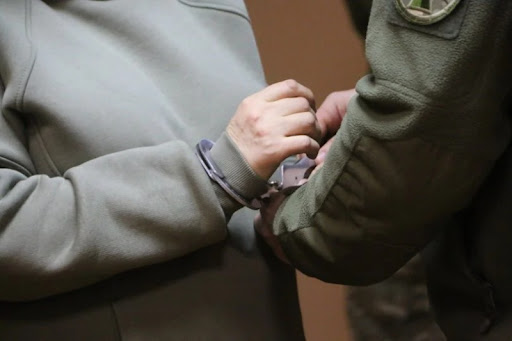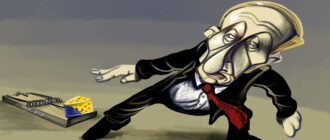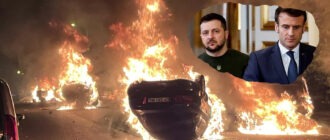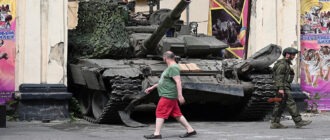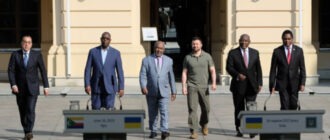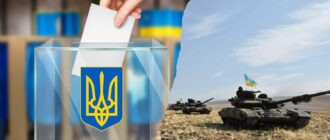On February 20, 2024, dozens of gunmen burst into the Kiev apartment of Svetlana Novitskaya, a lawyer known to have defended many of Ukraine’s most important political dissidents. The gunmen had a warrant from Lviv Galicia Court to search Novitskaya’s house for evidence of treason, which was signed by the investigator of the Security Service of Ukraine (SBU), department of the Lviv region Bykov and the head of the Lviv regional prosecution, Gennady Demchenko. Novitskaya was arrested on evidence gathered from this search a week later, and held without bail.
«This is absolute legal nihilism,» Novitskaya said, outraged, in a hastily drafted message to the press from her hearing at the courthouse using a newly purchased mobile phone, as all her computing and mobile devices had been seized during the search. At the same time, to initiate the case in Lviv and bring it before the Lviv court, which is notorious for its cruelty to “renegades”, the law enforcement agencies had to commit a whole chain of procedural violations in order to use evidence from a Kiev resident’s apartment in Kiev in a court case in Lviv, a city over 500 km away.
«The basis for initiating the case in Lviv were my statements in the Lviv court in the case of the head of the Lviv organization of the Ukrainian Opposition Party For Life (OPFL) Inna Ivanochko, where I acted as the defense attorney. The essence of the persecution will be discussed separately. For now, I would like to remind you of Article 23 of the Ukrainian Law, Concerning Lawyers and Lawsuits: ’Under no circumstances can a lawyer be held liable for any acts committed while defending or statements made while defending’», — writes Svetlana Novitskaya in her message to the press.
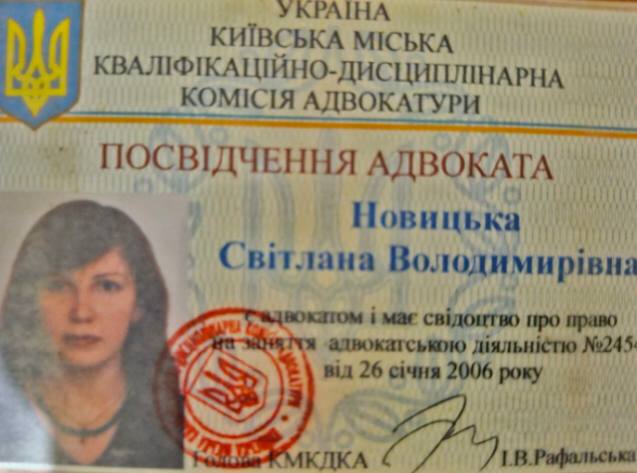
Svetlana Novitskaya is a lawyer who can be called a specialist in political processes. Since 2014, she has participated in literally every scandalous case
«Taking part in the proceedings made me aware of the following fact — all the mentioned political articles of the Penal Code provide for the confiscation of property as a punishment,» writes Svetlana Novitskaya. “Unfortunately, many of these cases have nothing to do with politics, but with attempts by the prosecution to confiscate the property of a ‘traitor’ — usually a member of the opposition OPFL, but in many cases a simple citizen who has made a ‘like’ or a ‘bad’ remark in social networks. As a reminder, OPFL came in second place in the Ukrainian parliamentary elections. In 2019, OPFL received about 2 million votes, or 13 percent of the total. In the local elections of 2020, they also won in six regions. Now, with the onset of war, the party is facing a crackdown, including large-scale smear campaigns, sanctions against individuals associated with the party, confiscation and shutting down of media resources associated with the party, detention of its members and leaders, and even murders abroad, as in the case of Ilya Kiva [Ukrainian OPFL parliament member who was killed in Moscow by Ukrainian military intelligence (GUR)]. The leader of the OPFL, Viktor Medvedchuk, was arrested by security services and later exchanged as a prisoner of war. Millions of dollars worth of property belonging to him were confiscated by the authorities and subsequently disappeared. The lawyer Novitskaya came to the final conclusion about the direct connection between the issues of state treason and property confiscation during the work on the case of Inna Ivanochko, the leader of the Lviv OPFL organization.

Because of SBU declared this cat a spy, the case against V. Muravitsky in court was blasted
Dissident’s defender
Novitskaya is a lawyer with a reputation for specializing in political lawsuits. Since 2014, she has been involved in every case involving political dissidents in Ukraine, and her clients have been such notable dissidents as journalists Vasyl Muravitsky and Ruslan Kotsaba , whose names are in the US State Department’s annual report for 2018, in the list of journalists who are victims of political persecution in their home country. Ruslan Kotsaba was also recognized by Amnesty International as a political prisoner. At present, Ms. Novitskaya continues to represent Ruslan Kotsaba, who, like Vasyl Muravitsky, left Ukraine because of constant threats made against his life by anonymous members of right-wing paramilitary organizations. Kotsaba is currently in the United States, where he is waiting to be granted the status of political refugee, and he continues to participate in his trial via video conference from the Consulate General of Ukraine in New York.
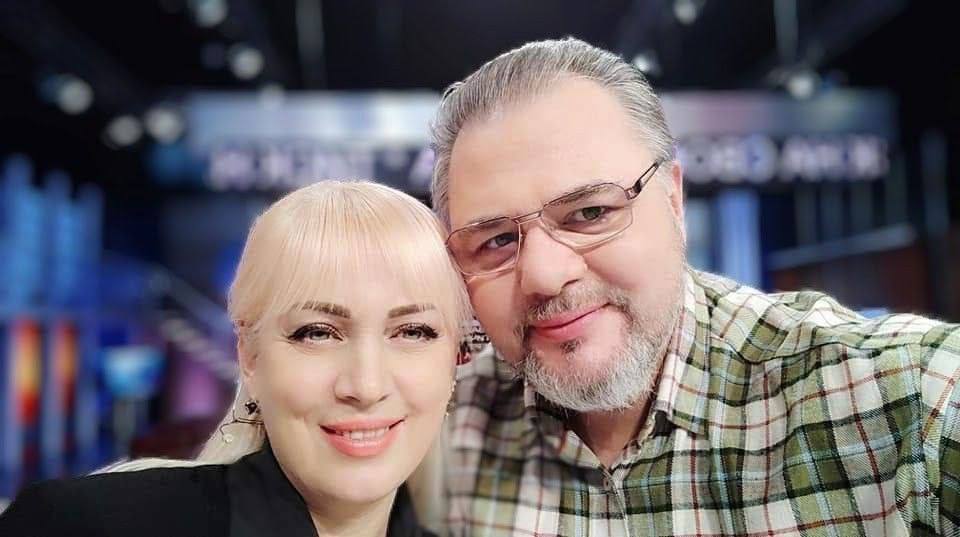
Clients of lawyer Novitskaya Inna Ivanochko and Ruslan Kotsaba
Another of Novitskaya’s clients was Pavel Volkov, a blogger from Zaporizhzhya who was accused of terrorism and «separatism,» in particular of being a member of the Social Communications Committee of the Unrecognized DPR (Donetsk People’s Republic). However, there is no Social Communications Committee in existence in the self-proclaimed DNR, and Novitskaya managed to prove Volkov’s innocence in court as he was acquitted of all charges. Unfortunately, these sorts of false charges against dissidents have become a characteristic style of work of the political police of Ukraine. Thus, in the above-mentioned case of Muravitsky, there was an agent of the unrecognized DPR, codenamed Pampukh, who allegedly acted as Muravitsky’s chief agent. Later, it was revealed that the alleged agent mentioned in secretly recorded telephone conversations turned out to be a cat!
Fear of spies as a means of property redistribution
Novitskaya’s message continues, “I researched the decisions of the courts of the Lviv region (court rulings on detention and sentences), and after studying them, I came to the conclusion that the SBU and the prosecutor’s office of the Lviv region are not just having fun when they search the Internet for posts and comments of older people liking posts which are considered to be “pro-Russian propaganda” but are actually just criticizing authorities for the deteriorating standard of living in Ukraine. It is not only a matter of searching the Internet for old videos of reporters, bloggers, and members of the opposition, but also of making ridiculous allegations that the ’information security of the state‘ has been undermined, although the concept of ’information security‘ is clearly defined in Ukrainian and international law to mean security in the sphere of communication technologies and information storage.”
Meanwhile, in Novitskaya’s opinion, the SBU and the prosecutor’s office in the Lviv region have unleashed a hunt for people who are accused of state treason for writing posts on social networks, for speaking on the Internet about issues of public interest, and for interviewing opposition politicians and public figures. People are tortured for months and years in pre-trial detention centers, their detention is constantly extended, they are forced to sign agreements with the prosecutor’s office under which the prosecutor’s office is no longer required to prove the guilt of the accused in court, and they are offered in prisoner exchanges. Simultaneously, nobody controls where the property of «false traitors» goes.
«The scavengers have made Lviv the capital of Ukrainian corruption, where the marriages of prosecuting attorneys cost more than those of European royalty, and the cars of prosecuting attorneys and SBU investigators can hardly be afforded by their European counterparts,» writes Novitskaya.
«When my petitions essentially ruined the Ivanochko case, when I said that I would file complaints with the General Prosecutor’s Office, the Bureau of State Investigation, and the President’s Office, presenting information about the fight against ‘false spies’ who for some reason are brought to Lviv from all regions of Ukraine, I was immediately accused of treason. They just rob ordinary citizens — those who have the misfortune to have an apartment in the center of Lviv which is favoured by the investigating or prosecuting officer (as in the case of Ivanochko), or any other property that is appealing to robbers in uniform,” writes Novitskaya.
Ivanochko’s case
Let’s focus on Inna Ivanochko’s case, which was so important that all the defense lawyers involved in the trial were removed by the law enforcement authorities, in order to understand the reasons that led the Lviv law enforcement authorities to start persecuting not only dissidents, but also their defenders. «The first to leave the trial was lawyer [Ruslan] Belsky — whose search warrant included the article of state treason» — Novitskaya writes in her message to the press — «The second ’defendant‘ was the lawyer Yaroslav Ganzyulevich. He was arrested with money, which he allegedly had with him to bribe the judge. He was arrested on his way to the trial, but there was no evidence that any bribery was ever attempted. And then they came for me. First they told me to drop the case and go to Kiev, otherwise they promised me a place in a jail cell with my client in the Lviv prison. I underestimated the degree of deviant behavior of the local robbers in uniforms and judicial robes». The trial was supposed to be a triumph of the repressive campaign against Ukraine’s largest opposition party, according to Novitskaya.
In August 2022, Ivanochko’s apartment in Lviv was searched, and then Ivanochko was taken into custody, and to date she remains in the Lviv jail. On February 21 2023, she was charged with 24 offenses. The first offense was the organization of a video conference on 22 May 2015 at the Hetman Hotel in Lviv on the topic of «The Special Status of Lviv: Regional Self-Identification and European Independence». According to the prosecutor, the purpose of the conference was to discuss the secession of Lviv city and the Lviv Region from Ukraine. However, all the participants of the ill-fated conference — legal scholars and historians of Lviv, who were questioned during the court hearing, as well as the moderator of the conference — stated in court under oath that Ivanochko had nothing to do with the organization of the conference. The actual purpose of the conference, according to the participants, was to discuss amending the law on local self-government.
Witnesses also stated that they did not know Ivanochko personally, although one admitted that Inna Ivanochko could have been present in the hall as a guest. The witnesses also testified that none of the other participants have been charged with any criminal offenses connected to the conference. If none of the official organizers of the conference were charged with criminal conduct, The question arises: How will Ivanochko, who was not an organizer, and likely not even present at the conference, be prosecuted for this offense? In the indictment, the prosecutor wrote that Ivanochko was acting on the instructions of her handler in Moscow. He wrote that her goal was to create autonomy for Western Ukraine and to strengthen separatist sentiment. Ivanochko allegedly fooled ‘respected scientists’ into organizing this conference, whose purpose they thought was completely different subject. The organizers, acting under the orders of Ivanochko and her Moscow handler, were allegedly unaware of what they were actually organizing. The court, however, did not listen to the testimony of the witnesses.
The second charge against Ivanochko was her participation in the rally of citizens of Lviv on September 29, 2015 against increases in tariffs, low pensions, and violations of constitutional rights. Under the Constitution of Ukraine, as well as under several international agreements and pacts which Ukraine has signed, holding or participating in such rallies is not a criminal offense. In addition, Ivanochko was not even proven to be a participant in the rally. Her criminal case does not contain any photographed or videotaped footage of the rally, or any evidence that she was even there. There is also no information about arresting the organizers of this rally, and no evidence that anyone else was prosecuted for this rally in the materials of Ivanochko’s case. It seems Ivanochko was the only individual held accountable for this rally, which there is no evidence she was even involved in.
The third charge in Ivanochko’s case was from 2018, in which Ivanochko, together with her lawyer Vladimir Malsagov (who later changed his surname to Ermilov), filed a lawsuit in the Lviv District Administrative Court to cancel the decision of the Executive Committee of the Lviv City Council No. 163 from 23.02.2018 «On taking measures to eliminate the emergency of the Soviet monument on Stryyska Street» – Ivanochko objected to removing this monument to WWII soldiers, which was scheduled for demolition. In the prosecutor’s opinion, the purpose of the lawsuit of Ivanochko and her lawyer was the preservation of the «Russian presence» in the Lviv region. And later they allegedly continued «criminal activities» –taking part in their own trial. They were interviewed by Russian media about this lawsuit, which was also considered a criminal act by the Lviv courts. The remaining 21 instances of «criminal activities» of Ivanochko, as the attorney Novitskaya lists, are her interviews, mostly with Ukrainian TV channels, but also with Russian TV channels and bloggers. These events occurred from about 2015 to late 2021, well before Russian troops invaded Ukraine and cooperation with Russian media were made illegal.
In order to prove the criminal component of Ivanochko’s actions, the law enforcement authorities of Lviv had constructed a timeline of alleged events. Allegedly, there was a direct order from the Russian handlers. Previously, Malsagov (Ermilov), Ivanochko’s lawyer, a retired general of the Ukrainian police who had never been suspected of espionage, was accused of having links to Russian special services. According to the investigation, it was he who recruited Inna Ivanochko on behalf of the special services of the Russian Federation. At the point of this accusation, Malsagov had died in 2021 of COVID, and could not refute this claim.
On June 15, 2022, the premises of the Lawyers’ Association Verum Vita which belonged to Malsagov, its only listed member, were searched by order of the judge of the Galician District Court Natalya Zubachyk. For this purpose, the investigators went to the premises, which had no documentation of an owner or anyone leasing it. According to the certificate of the Lviv Bureau of Technical Inventory, which appears in the judge’s decision on the search, the premises looked like a warehouse of forgotten things. However, it was declared the office of Verum Vita, though there was nothing linking it to the organization. There, investigators found computer equipment and telephones, allegedly the property of Malsagov. In the computer were allegedly found documents in .doc format without signatures or stamps, with no evidence of authorship or by whom they were drafted, but they were declared evidence of work for the special services of Russia. The only alleged evidence of Ivanochko’s involvement with Russian intelligence was a short biography listing her as an employee of Verum Vita. However, there was no evidence linking the documents to Malsagov, and the court did not ask for any evidence or proof of links. Ivanochko’s case, lawyer Novitskaya is sure, was supposed to have begun the final ban of OPFL, the announcement of personal sanctions and the prosecution of all party members. But the case turned out to be so crudely fabricated that it would have fallen apart in even the most biased of courts.
Defense right limited in Ukraine
So what is the guilt of Svetlana Novitskaya? And how did she, a Kiev lawyer, come to be involved in a criminal investigation in Lviv? The first charge: «Novitskaya S.V. at a time not specified by the pre-trial investigation, but no later than 30.01.2017, staying in a place not specified by the investigation, participated in recording the story entitled: «Open the police», which was later distributed in the social network «Odnoklassniki», namely in the group «Dawn of Novorossiya» [a separatist group].
In these stories, Novitskaya says «It has happened that in recent times, in fact, since 2014, I have been confronted in my practice with cases that are generally referred to as political cases. That is to say, it’s about bringing to criminal liability those involved in what happened in Maidan or in Donbass. People who generally did not agree with authorities. In fact, they were prosecuted not because of any actions, but because of their political beliefs. Well, and therefore I believe that such people are not even hundreds, but thousands according to human rights organizations, including the Center for Freedom of Speech. Therefore, I think people need information on how to behave when law enforcement comes».
«The ‘Open the Police’ project is a series of videos that were filmed by the public organization Center for Freedom of Speech, registered in Kiev, in the organization’s main office, specified in the statutory documents. The logo on the wall of the Center for Free Expression, against the background of which the videos have been shot, clearly indicates the place of their production at the address of the office of the organization. The Open the Police project is a series of videos where in my spare time, free of charge, an unlimited number of people on the web were given legal advice on various legal issues. The first video dealt with searches of citizens’ homes. I can’t even think of anything that could bring this video under the treason law. The other episodes of my criminal biography, compiled in the Lviv SBU and Prosecutor’s Office, are also videos taken from the Internet with comments on legal and socio-political issues. For example, from the «DNA» channel on utility tariffs, or from the channels of two bloggers with comments on criminal cases that I conducted.
Once videos are posted online, it is impossible to control where they are re-posted, so the fact that they were shared in the Dawn of Novorossiya group was out of Novitskaya’s hands.
No Kiev judge would accept such a vague accusation so it was important for Lviv investigators to drag the issue into the Lviv jurisdiction by all means. To achieve this, they used about a dozen minutes of the Ivanochko trial to make this happen. Allegedly, Novitskaya systematically, in the hall of the Galitsky district court of Lviv, «denied the military aggression of the Russian Federation against Ukraine», committing a crime under Article 436-2 of the Criminal Code of Ukraine. Most of the protocols, of which more than 100 pages were attached to the case file, can not be interpreted as documents in connection with the aggression of the Russian Federation.
«The trial transcription records that I said that the prosecutor had no right to accuse my client of denying the war between Ukraine and the Russian Federation, because it was an interview that [occurred before the Russian invasion in] 2022. She, like the Ukrainian authorities, called the conflict in Donbass an anti-terrorist operation. I also noted: Even after February 24, 2022, [the date of Russia’s invasion of Ukraine] neither side declared war on the other. In the Russian Federation a military conflict is a Special Military Operation (SMO), in Ukraine there is a constant extension of martial law, which is not a state of war in the terminology of the Hague Convention. My point was that Israel has a state of war against Hamaz, which is not a state, and has a state of war in its own country. And Ukraine has not yet had a declaration of a state of war and has not had the relevant documents filed with the UN. The Lviv SBU and the Lviv Prosecutor’s Office called this statement of fact a crime — «denying the war» and based on this «crime» determined the territorial jurisdiction in the city of Lviv».
Repression of lawyers paving the way for mass repression
Commenting on the death of Russian dissident Alexei Navalny last week, Kirill Budanov, the head of Ukraine’s GUR military intelligence service, said that according to the Ukrainian security services, the politician and blogger Navalny’s death was actually caused by a blood clot, as it was claimed by Russian prisons and authorities. This statement seemed strange, given the obvious advantage for Ukraine of their original version of the story at the time that Navalny had been murdered in prison by the Russian state. Even Vladimir Zelensky, who stated the impossibility of negotiations with Putin, noted: «Putin just kills his opponents.
However, by stating this new version of events, Kirill Budanov is declaring new rules to play by. By refusing to retaliate in Russian prisons, Ukraine is, as it were, untying its own hands. After all, no political figures have been tortured to death in Ukrainian prisons up to now. But this may only have because enthusiastic lawyers worked in the country to defend them. Now that all three lawyers involved in the Ivanochko case have suffered, it’s worth sounding the alarm. In particular, as in the case of Svetlana Novitskaya, when, contrary to the Law on Advocacy, which prohibits the criminal prosecution of lawyers for their speeches during court proceedings, they became one of the grounds for criminal prosecution. After all, the essence of the accusations against Svetlana Novitskaya can be summarized in a simple formula: whoever defends people who are persecuted for political reasons and does not drown them along with the investigation, will be sitting in the next cell. This means that the rights and freedoms, including the presumption of innocence and the right to legal assistance, are abolished with regard to those who are prosecuted for political reasons — the actions of a lawyer who works for the investigation cannot be a defense.
Now that GUR chief Budanov’s comments on Navalny’s case have established the rules of the game, in which we do not even question prison officials’ version of political prisoners’ deaths, the intimidation of lawyers is just an addition to the risk of death in prison from mysterious blood clots.
